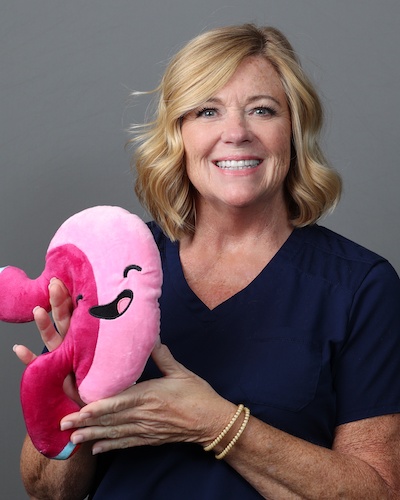Surgical Options for a Healthier Life
January 16, 2025
The bariatric surgery journey can be a life-changing, rewarding experience. What if a year from today you could look and feel like a new person? Sometimes the hardest part of this journey is the first phone call.
 Stelios Rekkas, MD, FACS, FASMBS, is the physician and director for Manatee Memorial Hospital Surgical Weight Loss Center. His bariatric coordinator, Cate Roskind, RN, CBN, shares the steps to surgery to help patients have a better understanding of weight-loss surgery.
Stelios Rekkas, MD, FACS, FASMBS, is the physician and director for Manatee Memorial Hospital Surgical Weight Loss Center. His bariatric coordinator, Cate Roskind, RN, CBN, shares the steps to surgery to help patients have a better understanding of weight-loss surgery.
I would like more information about bariatric surgery. Where should I start?
Patients interested in bariatric surgery are encouraged to call their insurance company to see if they have medical benefits for bariatric surgery as an initial step. Then, if they would like to learn more about their weight-loss options, they should call our office. A knowledgeable patient advocate will provide an initial phone screening by asking patients a few questions to determine if the patient meets general insurance criteria for bariatric surgery.
If the patient meets the general insurance criteria, the patient will then be scheduled for the first initial consultation with Dr. Rekkas. The patient will meet with the experienced bariatric team at the consultation appointment to discuss the surgery.
What should I expect after the initial consultation appointment?
After the initial consultation appointment with Dr. Rekkas and the bariatric team, the patient will begin individualized steps to surgery, which typically include the following, but can vary depending on insurance:
- A psychological evaluation
- A dietitian supervised diet which is either three or six consecutive months in duration
- An evaluation with a physical therapist
- Lab work
- An EGO (camera study of the stomach)
- Cardiac or other specialty clearance depending on the patient’s medical history
- Additional diagnostic testing may be required depending on the patient's history
Once these steps are complete, the patient will be scheduled for the preoperative consultation appointment with Dr. Rekkas, and if weight-loss goals are met, a surgery date will be scheduled.
What else happens before surgery?
Patients will attend their hospital pre-testing appointment and pre-op instruction class, usually one week prior to surgery. The bariatric coordinator will meet the bariatric patient in preop the morning of surgery, and then the OR, recovery and the bariatric nursing care unit. Patients typically stay overnight, then go home the next day, whether they have a gastric sleeve or gastric bypass surgery.
What are the most common postoperative concerns with weight-loss procedures?
Nausea, gas and pain are the most common side effects with these surgeries. Dr. Rekkas and his team follow best practice guidelines for medication options to keep patients as comfortable as possible in the postoperative period.
What are the guidelines for recovery?
As the bariatric coordinator, I will review the discharge instructions with the patient prior to discharge from the hospital. This includes activity restrictions, wound care, signs and symptoms of complications, diet instructions, medications and vitamins and when to call the office.
There is a structured post-op follow-up schedule to ensure we are meeting Center of Excellence (COE) criteria to ensure our patients are losing weight at a healthy rate. Generally, 4-6 weeks after surgery, patients can advance from their walking plan and start going to the gym or other activities. The post-procedure diet consists of five stages, including clear liquids, pureed foods, a soft diet and then a regular diet.
What would you say to someone who may still be hesitant?
I invite them to attend a monthly patient support group meeting. Attendees can sit and listen or ask questions if they would like to participate. Attendees are recent post-ops, those who are 3-12 months post-ops and others who may be several years post-op. If an individual doesn’t feel comfortable coming into a group setting, they can call me directly to discuss the surgery. As a former bariatric surgery patient myself, I understand the apprehension and anxiety individuals may have regarding surgical weight loss.
My goal as the bariatric coordinator is to ensure the patient is well educated and prepared for surgery. An important part of my job on the day of surgery is to provide emotional support to put the patient at ease before and after their surgery.
Schedule an appointment
Dr. Rekkas is accepting new patients. For an appointment, call 941-254-4957 or visit msaweightloss.com.
Individual results may vary. There are risks associated with any surgical procedure. Talk with your doctor about these risks to find out if bariatric surgery is right for you.
